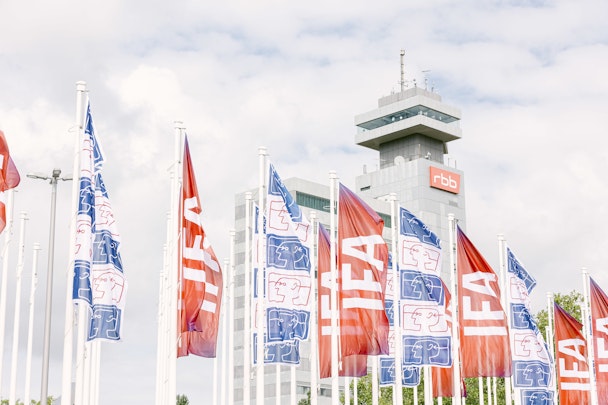At IFA 2023, consumer tech marketers are AI-obsessed. Here’s what they’re saying.
Fresh off a few days at Berlin’s consumer electronics bonanza, Make Honey’s Mark Terry-Lush reports back – with the help of a raft of marketers.

IFA Berlin 2023 was all about AI, says Make Honey's Mark Terry-Lush / Credit: IFA Berlin
Attending the International Funkausstellung (IFA), the world’s largest consumer tech trade show, in Berlin was a marathon of dazzling devices, dizzying displays, and deafening sounds.
IFA is famous for its smart home and phone launches. This year was no exception; and elsewhere, the show was a fish market of household appliances, connectivity, entertainment, eco-friendly power, robotics, transport, and wearables.
But the focus for most brands, perhaps inevitably in 2023, was on the impact of artificial intelligence (AI) on the next generation consumer electronics.
Advertisement
AI at IFA
From smartphone eco-systems showcased by the likes of AEG, Hisense, and Samsung, to device and appliance enhancements, AI is transforming the user experience and making everyday technology more intuitive and personalized.
AI-enhanced health and well-being features appear widely across wearables, including LIVALL’s cycle and motorcycle helmets designed to keep riders safer and more alert to their surroundings. And at Amazfit, AI is a core component of the IFA-launched Balance smartwatch, which creates customized plans based on individual fitness and goals, supplemented by a personal trainer AI chatbot for added motivation.
Unequivocally, the main advantage AI offers is personalization with precision at scale. This was the crux of brand messaging; if a device captures enough data, brands can use it to create bespoke responses and recommendations.
“AI and machine learning enable our devices to understand user preferences, adapt to their behavior, and provide customized recommendations,” said Olivier Dobo, marketing director at product company Honor UK. He added: “We can provide users with valuable insights into their well-being and help them make informed decisions to improve their health and fitness”. Dobo was in Berlin to launch the company’s new smartphone, the Magic V2, alongside the Honor Purse, an outward folding concept phone that doubles as a fashion accessory.
Advertisement
How AI will improve marketing
If AI is good enough to enhance our health, wealth, and entertainment experiences, how can it make marketing easier?
Alexandra Chevrier, TCL Communication’s marketing director for EMEA, sees evolution not revolution: “AI is not used in our day-to-day marketing operations yet, but we see how it gives us access to information very fast. For content, we have experimented with AI-powered language models like ChatGPT in brainstorming sessions, but the results are not mature enough to deploy locally or globally.”
But Leon Cheng Deng, chief finance officer at Amazfit owner Zepp Health, says marketing already benefits from automation: “Writing ads, digital marketing, Instagram, Facebook, this is only the start. In the future you will get tailor-made marketing, customized to consumer spending patterns and their day-to-day behavior. The change for the industry is going to be profound.”
Suggested newsletters for you
Fools rush in
While it’s encouraging that the discussion around AI and marketing has moved beyond ‘AI will steal your job’, there are more pragmatic concerns, too.
Electronics manufacturer Hisense Europe’s marketing director Alenka Potočnik Anžič counsels against marketers rushing in with no clear plan: “in marketing, AI can provide many benefits, but at same time it brings a lot of risks, especially if, like us, you’re working across diverse European markets. I see advantages in improved efficiency, fast and accurate data processing and optimized marketing campaigns. Challenges in AI we are facing now are primarily connected to data privacy, concerns of biases and inaccurate content, and lack of creativity. I am sure, with time, we will come to some common guidelines within the industry and not just for marketing, but general common standards will have to be set.”
Founding partner and head of design at Swedish audio brand Defunc Daniel Roos believes, though, that all marketing disciplines could be replaced by AI in the future: “It will probably result in layoffs and bankruptcy for many industries but also create new lines of work that we have a hard time pinpointing today.”
Rocky Liu, general manager of entertainment robot maker Robosen, agrees: “AI is integral to our research and development, and we now test it for content ideas, hashtag and emoji suggestions, which frees up time to focus on other areas. But when something is generated by AI, it’s not ready for consumers, so we see it as a tool for inspiration, with the human touch used to finesse it.”
Tobias Fransz, marketing manager for Western Europe at smart home brand IMOU suggests using different tactics: “We believe in a personal approach and AI is too mechanical. In 10 years, maybe it will be normal for marketers and consumers, but right now we don’t want artificial marketing, and there should always be a personal touch. It’s not time yet to hand over our marketing or design to AI."
This was echoed by smartwatch maker MobVoi, which used AI to create social media content, voice-overs, copy and artwork for its TicWatch 5 Pro launch – but only as inspiration. Neil Zeng, product marketing manager, warns that “AI for smart devices is in its infancy, but fast forward 12 months and both user experience and wearables’ tools will reap many personal benefits. For marketing, AI content is not attractive to consumers, it is easily identifiable and too universal. A consumer might enjoy it once, but after that they see through it.”
Despite these cautions, TCL’s Chevrier is optimistic: “long term, AI will improve marketing efficiency. We will of course need new skill sets, but ultimately AI will never replace good human marketers.”
Don’t be complacent. AI might be coming for your job. Time to ask ChatGPT how to save it.
Content by The Drum Network member:

Make Honey
Make Honey is an award-winning communications agency that creates impact for brands. Our clients cut through the media maelstrom and secure sales through PR, content...
Find out more
